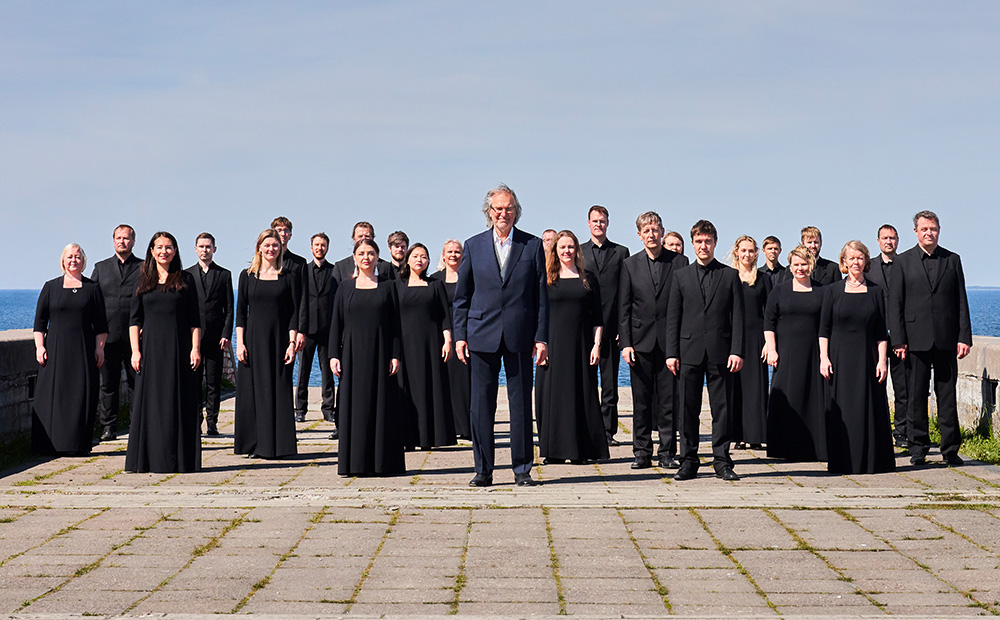Arvo Pärt 90
Programme
- Arvo Pärt: Berliner Messe
- Arvo Pärt: Summa
- Arvo Pärt: Nunc dimittis
- Arvo Pärt: Dopo la vittoria
- Arvo Pärt: Which Was the Son of…
- Arvo Pärt: Kanon Pokajanen (excerpts)
- Arvo Pärt: Magnificat
- Arvo Pärt: Veni creator
- Arvo Pärt: The Deer’s Cry
- Arvo Pärt: Drei Hirtenkinder aus Fátima
- Arvo Pärt: Littlemore Tractus
- Arvo Pärt: Prayer After the Canon
- Arvo Pärt: Vater unser
Performers
- Estonian Philharmonic Chamber Choir
- Tõnu Kaljuste – choirmaster
- Kadri Toomoja – organ
Pre-concert meeting with the author of a comic book about Arvo Pärt, Joonas Sildre, where he will present Pärt's life and work through a live comic-drawing / Suk Hall at 6.45 pm / in English and Czech
Arguably no contemporary composer has become as familiar to the general public as Arvo Pärt (*1935). The Estonian artist, whose prominent devotees include Björk, Peter Gabriel, rock musician Nick Cave, Rufus Wainwright and members of the German band Einstürzende Neubauten, writes sacred music almost exclusively, and this in his distinctive tonal compositional style, a technique he calls tintinnabuli (loosely translated as “the ringing of bells”). “I was in search of a little island of sound. In search of a place in my innermost being where – shall we say – a dialogue with God might take place,”states Arvo Pärt, conveying the unique world of his tintinnabuli. In 2025 the composer celebrates his 90th birthday and, to mark this event, the Prague Spring has invited an ensemble best qualified to bring his music to the concert platform: the holder of two Grammy awards for recordings of his music – the Estonian Philharmonic Chamber Choir (EPCC), which was hailed in 2020 by BBC Music Magazine as one of the top ten choral ensembles in the world.

“The works in our programme for the Prague Spring concert have remained in the repertoire of the Estonian Philharmonic Chamber Choir for decades, some even from the time the ensemble was founded,” states Tõnu Kaljuste, a member of the Royal Swedish Academy of Music and holder of the Japanese ABC International Music Award and the International Classical Music Award 2019, who established the choir in 1981 and led it until 2001. The EPCC was subsequently headed by first-rate musicians such as Paul Hillier, founder of the Hilliard Ensemble and the Theatre of Voices, German choirmaster Daniel Reuss and Latvian artist Kaspars Putniņš, before Tõnu Kaljuste returned to the post of artistic director and chief conductor of EPCC in 2021. Under the supervision of all these distinguished figures the Estonian Philharmonic Chamber Choir not only became one of the most respected ensembles in the Baltic region, but also one of the finest vocal groups worldwide. The British daily The Times defined their sound with the words: “Perfect intonation, dazzling tone and unanimity of attack.” The ensemble has appeared at the BBC Proms, the Salzburg and Edinburgh festivals, and at prestigious venues such as Carnegie Hall in New York, the Sydney Opera and the Walt Disney Concert Hall in Los Angeles. Accompanying the world’s most illustrious orchestras they have worked with stellar conductors – Claudio Abbado, Sir Simon Rattle, Mirga Gražinytė-Tyla and Gustavo Dudamel, to name a few. Their repertoire ranges from medieval music to pieces by contemporary, primarily Baltic composers, while the oeuvre of Arvo Pärt assumes a privileged position. The ensemble has literally travelled the globe performing his music, and their recordings of Pärt’s works, released by harmonia mundi and Virgin Classics, are today considered exemplary.

This Prague Spring concert presents a multi-layered cross-section of Pärt’s oeuvre, “which could be described as the best of Arvo Pärt for a cappella choir, or for choir with organ accompaniment,” says Kaljuste, “You will hear music created for different confessions,” he says of the programme, which will include, for instance, the famous Latin Magnificat, a cantata written to an Italian text, Dopo la vittoria, dedicated to the city of Milan to mark 1600 years since the death of St Ambrose, the piece Summa with its message encoded within a setting of the Latin Credo, or various parts from the Berliner Messe and from the extensive mystical composition Kanon Pokajanen, written to Orthodox Church Slavonic texts. Inspiration from Afro-American gospel performances and the composer’s distinctive humour come through in the piece Which Was the Son of…, sung in English, a musical setting of an excerpt from The Gospel According to St Luke, which traces the genealogy of Jesus back to Abraham, Adam and God Himself. The final choral work Vater unser from 2024 offers a sample of Pärt’s current work. “Balance between the voices was sublime, as was the sense of phrasing and, crucially, space; timings were perfectly judged to let the sound fill and fade naturally in the acoustic,” wrote the British newspaper The Guardian after one of EPCC’s concerts. You can look forward to the same sound experience at the Prague Spring, when Pärt’s “tintinnabular”, contemplative music fills the Rudolfinum’s Dvořák Hall auditorium on 19 May.








